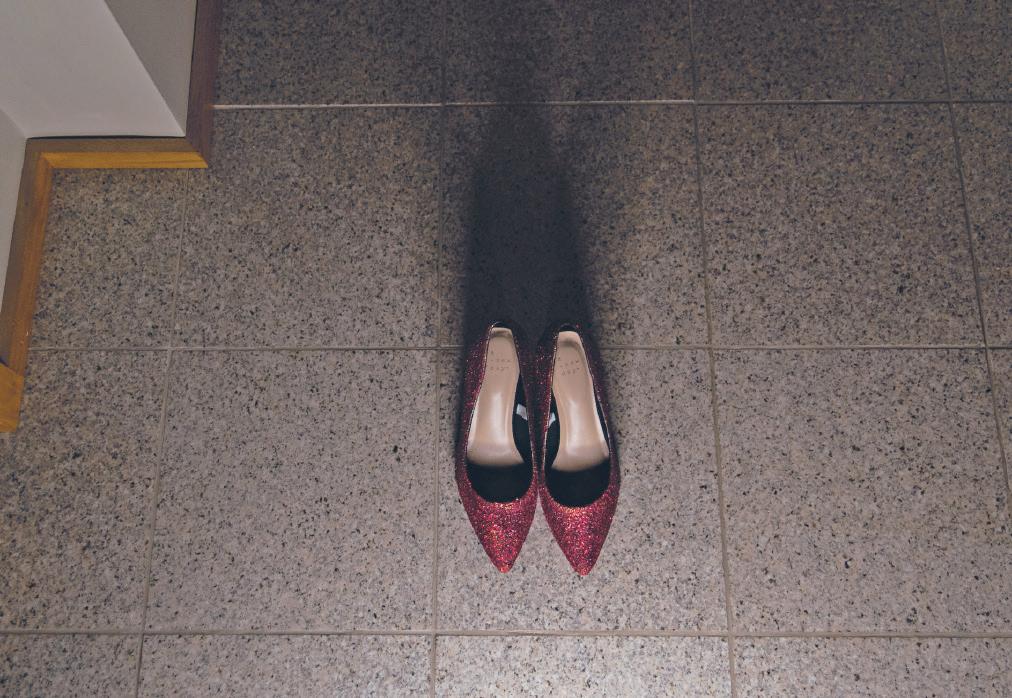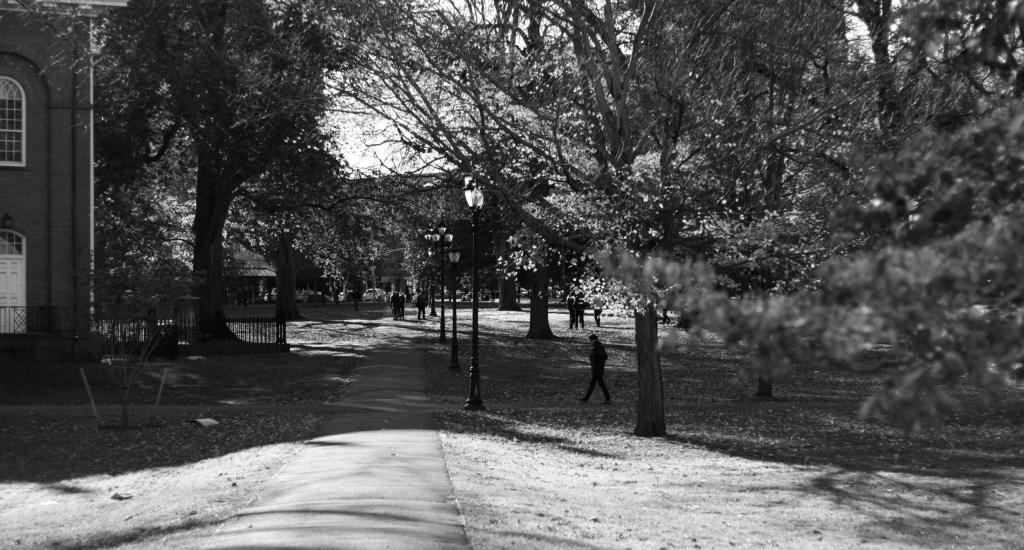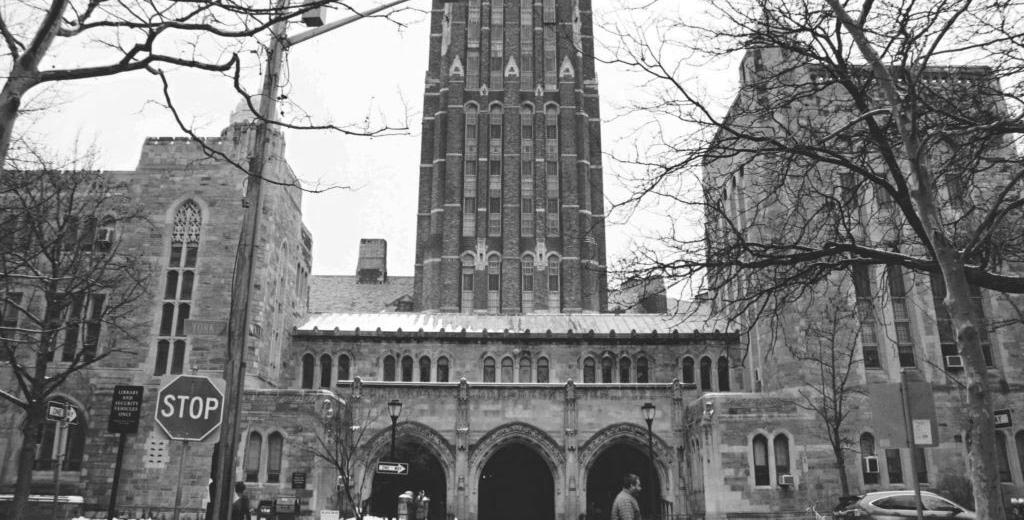
14 minute read
BY RAZEL SUANSING


Advertisement
Standing in my closet, I let go, submerging each lyric I sing with my memories, pain and anger. In front of me stands my microphone, taking in each vocal inflection and mapping them out onto a spectrogram. Twelve months ago, I was in Hartford, competing in the International Championship of Collegiate A Cappella with my group, Cadence. Twelve months ago, I was performing in front of a crowd. Now, I sing alone. This is the reality of a cappella during a pandemic. But how do you perform as a group when you are scattered all over the world? How do you produce a video without it falling into the category of something mundane? How do you bring together ten different pieces of footage in a way that doesn’t resemble the appearance of just another lifeless meeting over Zoom? Music is art. It is nothing short of beautiful. And something beautiful does not deserve to be reduced to something prosaic. Filming this video has been nothing short of a challenge. I have spent hours sewing, staging, adjusting lighting and focus, recording take after take, all in an efort to tell a story. Our song, “over the rainbow”, tells of being trapped in a dark place and capturing the essence of that is my goal. The song alludes to the Wizard of Oz and a descent into darkness. As I turn myself into the witch, I reflect on what that means to me personally. I let the lyrics play on repeat in my head, a broken record spinning ‘round and ‘round, focusing in on the truth behind the words. I like to film and edit at night when I have full control over the light and the color. There is a power behind each shadow. In the daylight, the contrast blinds, but at night it glows. After I have finished filming, I find the act of removing my makeup to be both relieving and melancholic. While on my gap year, my extracurriculars are the few things tethering me to Yale. When this video is done, a cappella will calm down again and I will be left feeling empty. And while I look forward to the respite to come, I cannot help but wonderwhat will fill the newly-opened hole in my calendar. ZOE BERG reports.



NEWS
“Remember that a civilized nation cannot just have one party; if there were only one party, this would merely be a dictatorship. Politics could not advance.” SUN YAT-SEN FIRST PRESIDENT OF CHINA
Elicker, New Haveners give continued plea for PILOT funding
BY THOMAS BIRMINGHAM AND OWEN TUCKER-SMITH STAFF REPORTERS
In a Tuesday morning hearing, New Haven residents and politicians came together to continue voicing support for a bill that would increase funding for the state’s Payment in Lieu of Taxes, or PILOT, program.
The hearing was hosted by the Connecticut General Assembly’s Finance, Revenue and Bonding Committee. It was held after Gov. Ned Lamont’s proposed FY 20212022 budget did not provide substantial boosts to the PILOT program — a move that New Haven Mayor Justin Elicker opposed. Tuesday’s bill, introduced by Senate President Pro Tempore Martin Looney of New Haven, would allocate more funds to municipalities with a higher proportion of tax-exempt property. New Haven, which now receives around $42 million annually through PILOT, would receive $91 million if the bill passed — a jump of almost $50 million. New Haven would receive the highest boost out of all the municipalities or districts covered by the bill, as it has the highest proportion of tax-exempt property.
The mayor and other New Haveners at the hearing said that the city — which faces a projected $66 million budget deficit for the next fiscal year — desperately needs additional funding to avoid resorting to major hikes in property taxes.
“This is by far the most important piece of legislation contemplated in this session,” Elicker said at the hearing. “It’s not only the highest legislative priority of the city of New Haven, but it’s essential to the vitality of many other communities and the economic wellbeing of our state.”
The tier system, which prioritizes cities with larger amounts of tax-exempt land, designates tiers based on the per capita value of the city’s net grand list — or the value of its taxable property. The first tier, which includes New Haven, is for cities with under an under $100,000 per capita grand list figure. Cities in this tier would receive 50 percent of what the state’s PILOT formula is supposed to provide — 77 percent of lost property tax revenue. Tier two and three cities would receive 40 and 30 percent of this 77 percent figure, respectively. The state has never actually provided the 77 percent reimbursement that the PILOT formula stipulates, and Looney called the figure “aspirational.”
Elicker said that Connecticut, compared to other states, is over reliant on property taxes. While PILOT was intended to remedy this, funding through the program has dropped over the last two decades and tax-exempt property in New Haven is on the rise. This combination, Elicker said, has led to an “increasingly challenging financial situation for our city, putting pressure on our ability to provide the very basic services that our residents and taxpayers need.” Elicker called New Haven’s situation “dire,” as he said he was forced to cut over 100 jobs in his last budget — while still raising taxes.
The price tag on the three-tiered PILOT model comes to around $129 million, Looney said. But in response to the cost, Elicker said there was no safe alternative.
“What do we think will happen if the city of New Haven ceases to be an economic engine in our state?” Elicker asked the committee. “How are we supposed to attract new residents when our cities are increasingly unafordable? The annual cost of this proposal pales in comparison to the revenue it would generate if we chose to invest in our cities and help them build out of this pandemic stronger than before.”
Several other mayors and first selectmen from across the state also gave their testimony on Tuesday, demonstrating bipartisan support for the program as well as a general sense of frustration towards Lamont’s handling of the proposal. In particular, New London Mayor Michael Passero said he was “very disappointed” with the governor’s proposed budget.
Darien First Selectman Jayme Stevenson, one of the more vocal state Republicans in support of PILOT funding, testified in favor of the program — even though her city would fall into a tier that would receive the least additional funding.
“The health of our state is dependent upon many factors,” Stevenson said. “One of them is the health of our urban centers.”
Looney told the News he shares Elicker’s commitment to locking down PILOT funding, but also said he was less critical of Lamont’s proposed budget. Looney said that based on “personal conversations” with the governor, as well as several public statements in which Lamont expressed more general support for increased PILOT funding, Looney was optimistic about the potential for success with the bill.
Looney also said he was deeply encouraged by the over 20 New Haveners who came out to express support for the bill on Tuesday.
“Governor Lamont has said to me that he is supportive of PILOT and recognizes its equity,” Looney said. “The issue is just finding the funds to implement it. [The hearing] was a sign of the broad based recognition of the fairness of this proposal.”
Although no one testified against the bill, some Republicans expressed

DANIEL ZHAO/SENIOR PHOTOGRAPHER
New Haven would receive $91 million if the new PILOT bill passes. As of now, it receives $42 million annually.
skepticism over its effectiveness. Darien State Rep. Terrie Wood called out the fact that Democrats have held control of the legislature since the 1980s but have not made a move to fund PILOT at this level. At the hearing, Wood questioned why Democrats had not already fully funded PILOT.
Ofering support to Looney, New Haven State Rep. Roland Lamar said more focus should be placed on the root of financial problems in Connecticut municipalities rather than on why PILOT has not been funded over the years.
According to Lamar, this is because Connecticut property taxes are “not sensitive” to varying levels of income. Though higher-income individuals generally pay more in taxes, Connecticut residents are paying the same percent on property taxes regardless of how financially well of they are. Lamar said PILOT funding would help ease that burden, and cities like New Haven can avoid significantly raising property taxes for all.
Harold Brooks, president of Local 3144 — a union comprised of management professionals who work for the city of New Haven — echoed Lamar’s concerns about the disproportionate efect of increased property taxes on low-income families. However, Brooks went further to state that increased PILOT funding is an essential step to address systemic racial inequality in New Haven.
Brooks said because the state has never fully funded the PILOT program, previous raises in property taxes and cuts in services have disportionately afected people of color.
“The underfunding of PILOT continues to exacerbate inequality in our communities,” Brooks said. “COVID-19 showed how large the inequity between communities of color and ones that receive a disproportionate amount of PILOT funding is. This structure would correct an injustice that has existed for years.”
The bill awaits a vote by the Finance, Revenue and Bonding Committee.
Contact THOMAS BIRMINGHAM at thomas.birmingham@yale.edu and OWEN TUCKER-SMITH at owen.tucker-smith@yale.edu.
YLS announces two gifts to support student critical needs
BY JULIA BROWN STAFF REPORTER
Yale Law School announced two gifts to the school last week honoring the life and legacy of Michael Varet LAW ’65 that will support “critical needs” of students at the law school: emergency expenses and funding for work in environmental law.
The gifts come from the Middle Road Foundation, the Varet family’s private foundation that focuses on education and healthcare, among other issues. The gifts established two funds: The Michael A. Varet ’65 YLS Safety Net Support Fund and The Michael A. Varet ’65 Summer Public Interest Fellowship Fund. The YLS Safety Net provides emergency funding that law school students may use for unexpected expenses. The Public Interest Fellowship Fund seeks to help train future lawyers so they can address environmental challenges. The fund will enable four first-year Law School students to spend their summers working for environmentally focused public interest organizations that otherwise would not have had enough funding to hire them.
“We could not think of a better way to honor my father — who was completely devoted to Yale Law School — than to make a gift that will both meet the exigent needs of its students, about whom he cared deeply, and support critical public interest work undertaken to address the climate crisis,” Varet’s daughter, Sarah Varet LAW ’04, said in the announcement of the gifts.
Students may use the funding from the Public Interest Fellowship Fund to support their work with relevant environmental law and advocacy organizations, such as Earthjustice, the Sierra Club, the National Resources Defense Council and the Environmental Defense Fund.
While Varet — who passed away in May 2019 — graduated from the Law School more than 50 years ago, he remained very involved with the Law School throughout his life.
Varet was a member of the Yale Law School Fund Board, which helps facilitate and promote the majority of gifts that are given to the Law School. He also served on the Yale Law School Association’s Executive Committee, which meets twice a year to discuss various programs at the Law School and helps connect Law School alumni and students around the world.
“We are profoundly grateful to the Varet family for their gifts to the Law School,” Law School Dean Heather Gerken said in the announcement. “Although Michael never sought or expected acknowledgement of all that he gave to Yale, we owe him a debt and are honored that his family has chosen to celebrate his legacy in this way.”
Varet was also involved with the diversification of the Sterling Law Building’s portrait collection, working to help the collection better reflect the history of the Law School. He funded many new portraits, including those of LGBTQ activist Charles Reich LAW ’52, former Law School Dean James Thomas LAW ’64, Supreme Court Justice Sonia Sotomayor LAW ’79 and civil rights activist Pauli Murray LAW ’65.
Varet’s gift for the YLS Safety Net endows the preexisting emergency funding program that was first established in 2019.
“The Michael A. Varet ’65 YLS Safety Net Support Fund enables Yale Law School to provide critical assistance to high need students facing unanticipated financial hardships,” Associate Dean of Law School Admissions and Financial Aid Miriam Ingber LAW ’04 wrote to the News. “This fund will continue to positively impact generations of YLS students, and we’re very grateful to the Varet family for their incredible generosity.”
According to Gerken, the Law School’s Safety Net has been able to support students by covering a “myriad” of unexpected student expenses during the COVID-19 pandemic, including emergency flights home, temporary housing and costs associated with technology needed to study remotely.
Over 25 percent of the Law School class of 2023 are the first in their family to attend any professional school. According to the announcement in “YLS Today,” Varet’s gift helps provide many of these students with needed financial liquidity or family support to pay for unexpected expenses.
“Michael cared deeply about the many first [generation students] we’ve welcomed into the school and understood how important it is to provide a ‘safety net’ for those students who do not already have one,” Gerken said. “Now that the Safety Net has been endowed by the Varet family, we have the necessary resources to meet the needs of students for generations to come.”
Over 70 percent of Law School students received some form of financial aid in the 2020-21 academic year, according to the school’s financial aid website.
Contact JULIA BROWN at julia.k.brown@yale.edu.
Graduate school deadlines may block senior athletes with eligibility
BY MADISON HAHAMY AND JAMES RICHARDSON STAFF REPORTERS
Last Thursday, Yale’s graduating class of student-athletes learned that the Ivy League had granted a waiver permitting seniors to compete in their sport next season as graduate students, but with one caveat: they must have been admitted to a degree-granting graduate program.
The announcement’s timing left some athletes confused, as it came after final deadlines for graduate school applications — the latest of which was Jan. 2.
In an email to the News, Lynn Cooley, dean of Yale Graduate School of Arts and Sciences, reiterated that the latest application deadline, Jan. 2, had already passed and that “admissions decisions are nearly complete.” She pointed the News to a page listing various accommodations for prospective students listed on the Yale Graduate School of Arts and Sciences website. The website lists “global pandemic (e.g. COVID-19)” as an extreme circumstance case for flexibility in admissions. Cooley declined to comment on whether senior athletes specifically might be able to submit applications past the deadline due to the pandemic.
The website indicates that individual programs have discretion in considering applicants who wish to apply after Jan. 2.
The News interviewed directors of graduate studies from three different programs — English Language and Literature, Political Science and Statistics and Data Science — who expressed varying levels of willingness to pursue application extensions for athletes who wished to apply to graduate school at Yale after hearing of the exception.
Both DGS for Political Science Alexandre Debs and DGS for English Language and Literature Catherine Nicholson told the News that deadlines for their programs have passed. Debs said he was not aware of the new Ivy League eligibility exception for 2021-22.
“My guess is that this decision would really only be meaningful for students who have already applied and who get accepted in the usual way,” Nicholson said.
However, Co-DGS for Statistics and Data Science John Emerson wrote in an email to the News that, while no students have yet asked him to extend the deadline, he “would certainly be willing to consider it,” especially for their MA/MS program “that might be suitable for some students.”
Yale’s Associate Athletic Director of Compliance Jason Strong, who originally notified senior athletes of the Ivy League waiver in an email last Thursday, told the News that Yale Athletics will assist seniors with the necessary waivers for utilizing their eligibility.
However, Strong noted that the graduate admissions process is “under the purview of each graduate school.” Furthermore, students wanting to pursue this option are

YALE DAILY NEWS
Individual graduate programs have discretion in considering applicants who wish to apply after Jan. 2.
“responsible for their own application and admissions process.”
According to the Graduate School’s accommodations page, students who are interested in applying to graduate school after the Jan. 2 deadline should contact the DGS and registrar of the program in which they are interested. The DGS and registrar would then need to contact the Graduate School if they want to consider the request.
Most students who are accepted into the Graduate School’s programs must accept their ofers by April 15.
Contact MADISON HAHAMY at madison.hahamy@yale.edu and JAMES RICHARDSON at james.richardson@yale.edu.






